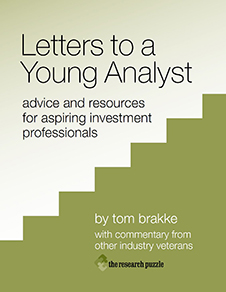
- Wednesday, February 25th, 2009
- the mysterious waffle
-
Of late, I have written about common incentives in the investment world and the distortions and unintended consequences that result.the research puzzle | This is the fifth in the series. In the last, I thought that we should just “let them go.” I continue with an examination of another industry practice, the definition of which I had to get from The Broker’s Dictionary:
Of course, brokers aren’t the only ones that get signing bonuses; they are common throughout the industry. In all cases, the clients that are affected by the changes need to think about the implications going forward. For the customers of brokers (OK, they like to be called “financial advisors” these days), at least they know about the move right away, unlike a mutual fund shareholder, for example, who might find out much after the fact that a portfolio manager or analyst team has gone on to greener pastures.
Given the frequency with which I have heard the term, I figured a search on “waffle” used in an investment context would turn up a fair number of worthwhile articles and postings. Instead, I got almost nothing, making me think that it’s a mystery to many.
Paying waffles has been standard practice for quite awhile, but the vast changes in the brokerage community recently have led to an intensified scramble for “producers.” Assets equal revenues, goes the thinking at the firms doing the poaching, so let’s get those that control the assets. It would be interesting to see their ledgers over the years to see whether that basic instinct is sound and what long-term impact on the bottom line comes from buying talent in this way versus developing it internally. Presumably it works, because people keep doing it, although it could be yet another example of “following the leader” to destructive behaviors.
For the financial advisors it seems like easy money. There are strings attached that you can get tripped up by or wrapped up in,OverRegd | In section three of this piece, Katherine Vessenes outlines some of the pitfalls that can arise for those on the receiving end of the largesse. Interestingly, this was one of the few articles I found on waffles on the vast Internet, yet Vessenes is five minutes down the road from me. but the payouts can be quite extraordinary (100%, 200%, or even 300% of the yearly revenues produced) and hard to resist.
As you might imagine, my concern is not with the firm or the advisor, but with the client. If I am a client, is any of this activity done in my best interest? Probably not. While I might like my advisor and am happy to see him get some extra money, the message I get from this activity is that the advisor is a person who is good at generating fees, and the fees come from me and my ilk. Plus, I am forced to make a choice about following him or dealing with someone new.
If I move, I am inconvenienced in a variety of different ways, may find that proprietary products from my old firm don’t move to the new one, could have assets that are out of reach during the transition, and might become fodder for a series of products to be pushed by the new firm (since I am the source of the anticipated revenues that are to make the deal work). All of this without compensation or benefit of any sort to me. All downside and no upside.
A client should move to a new firm because it makes sense for her, not because it makes sense for her advisor. And it is a perversion of the word advisor (yes, broker would be better after all) to in effect sell customer relationships to whomever provides you with the biggest payday.
We now move to new horizons in our incentive review — looking at compensation practices for executives in general and how they fit in the research puzzle that we are attempting to piece together.

